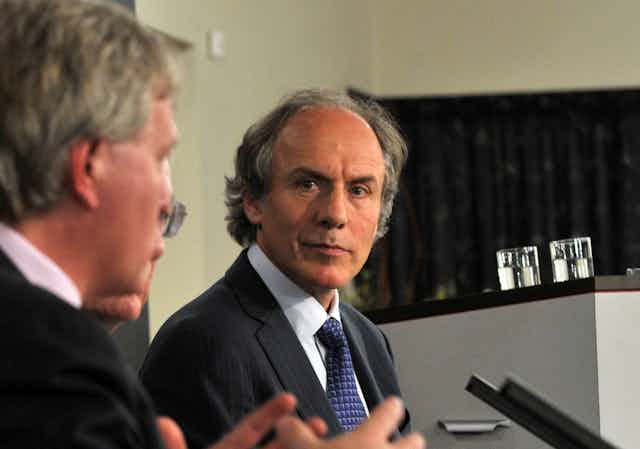Engineer, entrepreneur and philanthropist, Dr Alan Finkel, has been appointed Australia’s new Chief Scientist, and will assume the post in 2016 once the current Chief Scientist, Professor Ian Chubb, completes his five year term.
Members of the Australian scientific community have offered their reactions to the news of Dr Finkel’s appointment.
Professor Merlin Crossley
Dean of Science, University of New South Wales
Many scientists will be delighted at the news. Alan Finkel is a brilliant, energetic and persuasive communicator. He is passionate about science and has been a champion of education at all levels. He understands the importance of knowledge and its applications, and he has a record of success as an entrepreneur and business leader.
Through his magazine, Cosmos, he has an enormous breadth of scientific knowledge, and having been Chancellor of Monash University, he knows what universities can do when they have the right vision.
He’s someone with the intelligence and confidence to be able to drive an ambitious and positive agenda. He’ll be able to advocate strategies that work and help the government to see through sensible policies, rather than jumping from one doomed short term fix to another.
Ian Chubb will be a hard act to follow but it is great to see someone like Alan Finkel take over, and I’m sure he’ll help the government enact good policies in critical areas, like inspiring school kids via pure science, providing fellowships for our young researchers, sustainably funding research infrastructure, engaging with industry, and finally using scientific thinking to address the grand challenges facing our nation.
Professor Brian Schmidt
Distinguished Professor, Australian National University
Alan Finkel is worthy successor to Ian Chubb. His experience as scholar, innovator, businessman, and university chancellor covers the whole gambit of science-related activities, and is underpinned by a great personal enthusiasm for the betterment of Australia. I look forward to working with Alan in the years to come.
Sir Gustav Nossal
Emeritus Professor in the Department of Pathology at the University of Melbourne
This is truly the most fantastic news. [Alan] Finkel is an extraordinary leader. He has proven himself in personal scientific research. He has succeeded in business in competitive fields. He has worked for the public good, most notably in his presidency of the Australian Academy of Technology and Engineering.
He has been unbelievably generous in philanthropy, supporting exciting causes. He has shown leadership in the university world. He is a scientific publisher of note. Beyond all this, he is a person of the highest intelligence, integrity and imagination.
It is difficult to think of anyone who would do this important job with greater distinction.
As an aside, Australia may be “getting two for the price of one”, as his wife, Elizabeth Finkel, is a distinguished science journalist and author.
This news has made my day, my week, my month and my year.
Professor Les Field
Deputy Vice-Chancellor (Research) & Vice-President at the University of New South Wales
The announcement of Alan Finkel as Chief Scientist is great news. I can think of nobody better suited to the role and to fill the enormous shoes that Ian Chubb will leave behind.
Alan brings a strong research background as well as wealth of experience in both academia and industry. He understands first hand the importance of excellence as well industry engagement in driving innovation and that’s exactly what Australia needs to drive policy forward over the next few years.
Professor Peter Doherty
Laureate Professor from the Department of Microbiology and Immunology at the University of Melbourne and Nobel Laureate for Medicine in 1996
Alan is a successful science entrepreneur, a philanthropist and a dedicated supporter of public science communication. His appointment as Chief Scientist is to be greatly welcomed, and it is a measure of the man that he is prepared to take on this complex task.
With Canberra’s new spirit of openness to innovation and thinking in terms of the future, at least in the parliament, there is a good possibility that his voice will be heard and we will again see Australia moving forward.
Dr Andrew Siebel
Deputy Chair, Australian Early- and Mid-Career Researcher (EMCR) Forum at the Australian Academy of Science, and Senior Research Officer at Baker IDI Heart and Diabetes Institute
The EMCR Forum is delighted with the appointment of Dr Alan Finkel as the next Chief Scientist of Australia. As President of the Academy of Technological Sciences and Engineering (ATSE) and founder of Cosmos magazine, Professor Finkel has been a great advocate for science and technology. His insight and experience in industry and academia will bring enormous value to the position previously held by Professor Ian Chubb.
The Prime Minister vowed last week to put science “at the centre” of his government’s agenda and at the “very heart” of its future. This appointment demonstrates a focus on innovation and translation of science into industry, and an emphasis on science education and literacy.
In 2013, Australia ranked 18th out of 20 advanced economies for government R&D spending as a share of GDP. Finkel’s appointment strengthens the call for Australia to lift public and private R&D from 2.2% of GDP to 3%.
Professor Frieder Seible
Academic Vice-President (Industry Engagement), Dean of Engineering and Dean of Information Technology, Monash University
I think this is the ideal appointment. As a scientist and entrepreneur, Alan is always looking for innovation and that’s exactly what Australia and society needs right now. As Chancellor here at Monash he is highly engaged and at the forefront of every major project and operation – I think he will bring the same qualities to his new role as Chief Scientist.
Another one of Alan’s key characteristics is his inquisitive nature. No matter the scientific topic, he always wants to probe deeper. Again, I think this makes him ideally suited for this role.

